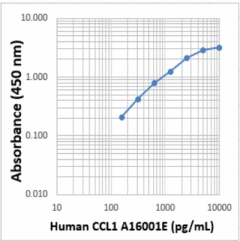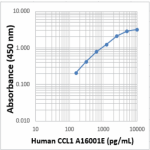- Clone
- A16001E (See other available formats)
- Regulatory Status
- RUO
- Other Names
- T lymphocyte-secreted protein I-309
- Isotype
- Mouse IgG1, κ
- Ave. Rating
- Submit a Review
- Product Citations
- publications

-

Direct ELISA showing purified anti-human CCL1 (I-309) (clone A16001E) bound to plate-immobilized recombinant human CCL1 (I-309) protein (Cat. Nos. 582702, 582704, 582706 and 582708). The wells were incubated with serially diluted primary antibody at room temperature for 2 hours in 1% BSA-PBS, followed by incubation with HRP Goat anti-mouse IgG (Cat. No. 405306). TMB High Sensitivity Substrate Solution (Cat. No. 421501) was used for detection. Absorbance was measured at 450 nm.
| Cat # | Size | Price | Quantity Check Availability | Save | ||
|---|---|---|---|---|---|---|
| 613252 | 100 µg | 188€ | ||||
CCL1 was initially identified as a secreted protein derived from activated T cells. The CCL1/CCR8 axis is involved in the recruitment of Th2 effector cells in vivo to sites of allergic mucosal inflammation. As a result, there is an increase of CCR8+ CD4 T cell numbers in allergic asthma and a higher concentration of CCL1 in bronchoalveolar lavage of asthmatic patients compared with normal controls. In addition, high levels of CCL1 have been detected in the serum of patients with atopic dermatitis. CCL1 is constitutively expressed in normal skin, and CD8 and CD4 CCR8+ cells have been isolated from normal skin. Therefore, it has been suggested that CCL1/CCR8 play a role in skin immunosurveillance. In addition, a more recent publication showed that CCL1 transcript is upregulated in CD4 converted to Tregs by TGF-β in vitro, and this transcriptional upregulation is reversed by IL-6. This data suggests that CCL1 plays a role in Treg conversion. Antibodies against CCL1 inhibit the suppressive function of Tregs. Furthermore, the antitumor effect of CpG-ODN plus anti-CCL1 in BALB-neuT mice suggest that neutralization of CCL1 can be used as an adjuvant to antitumor immunotherapy.
Product DetailsProduct Details
- Verified Reactivity
- Human
- Antibody Type
- Monoclonal
- Host Species
- Mouse
- Immunogen
- Human Recombinant CCL1 Protein
- Formulation
- Phosphate-buffered solution, pH 7.2, containing 0.09% sodium azide
- Preparation
- The antibody was purified by affinity chromatography.
- Concentration
- 0.5 mg/mL
- Storage & Handling
- The antibody solution should be stored undiluted between 2°C and 8°C.
- Application
-
Direct ELISA - Quality tested
- Recommended Usage
-
Each lot of this antibody is quality control tested by Direct ELISA. The optimal concentration of this reagent for the specific application and the experiment design should be established by the end-user.
- Additional Product Notes
-
This product is intended for sandwich-based immunoassay development on various assay platforms requiring antibody pairs. This antibody (clone A16001E) could function as a capture antibody when paired with Biotin anti-human CCL1 antibody (Cat. No. 612253) (clone A16001C) as the detection antibody and using Recombinant Human CCL1 (I-309) (carrier-free) protein (Cat. Nos. 582702, 582704, 582706 and 582708) as the assay standard.
- RRID
-
AB_2941611 (BioLegend Cat. No. 613252)
Antigen Details
- Structure
- Chemokine
- Distribution
-
T cells, Th1, Th2, diabetogenic T cells, peritoneal macrophages, peritoneal mesothelial cells, Langerhans cells, monocytes, mast cells, NK cells, endothelial cells, and epithelial cells
- Function
- CCL1 chemoattracts CD4 Th2 cells and plays a key role in the progression of Th2 type hypersensitivity.
- Interaction
- T cells, Th2 cells, macrophages, microglia, FOXP3+ CD4 regulatory T cells, skin-homing CLA+T cells, monocytes, NK cells, dendritic cells, endothelial cells, and smooth muscle cells
- Ligand/Receptor
- CCR8 (CDw198)
- Biology Area
- Cell Biology, Signal Transduction
- Molecular Family
- Cytokines/Chemokines
- Antigen References
-
- Miller MD, et al. 1989. J Immunol. 143:2907-16.
- Haque NS, et al. 2004. Blood. 103:1296-304.
- Gombert M, et al. 2005. J Immunol. 174:5082-91.
- Montes-Vizuet R, et al. 2006. Eur Respir J. 28:59-67.
- Soler D, et al. 2006. J Immunol. 177:6940-51.
- Gonzalo JA, et al. 2007. J Immunol. 179:1740-50.
- Mutalithas K, et al. 2010. Clin Exp Allergy. 40:1175-85.
- Gene ID
- 6346 View all products for this Gene ID
- UniProt
- View information about CCL1 on UniProt.org
Related FAQs
Other Formats
View All CCL1 Reagents Request Custom Conjugation| Description | Clone | Applications |
|---|---|---|
| Purified anti-human CCL1 (I-309) | A16001E | Direct ELISA |
Compare Data Across All Formats
This data display is provided for general comparisons between formats.
Your actual data may vary due to variations in samples, target cells, instruments and their settings, staining conditions, and other factors.
If you need assistance with selecting the best format contact our expert technical support team.
-
Purified anti-human CCL1 (I-309)

Direct ELISA showing purified anti-human CCL1 (I-309) (clone...
 Login / Register
Login / Register 







Follow Us